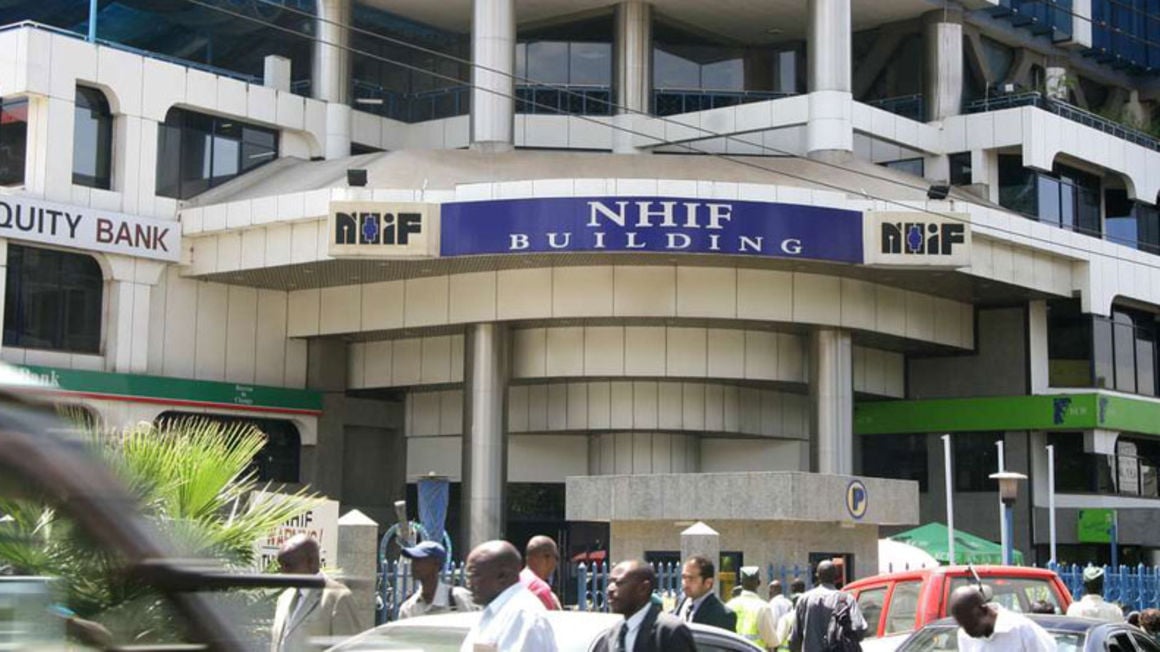
NHIF Building in Upperhill, Nairobi. FILE PHOTO | NMG
Summary
- The changes are aimed at supporting a smooth implementation of a unified payroll system which the Kenya Revenue Authority (KRA) recently rolled out for joint declaration and payment of the three deductions as well as Pay-As-You-Earn (PAYE).
- This will be a departure from the current practice where NSSF and NHIF deductions are submitted by the 15th and the 9th of every month, respectively while training levies are remitted on the 10th day of every month.
- The portal will allow all the four institutions to monitor statutory payments coming from each employer, making it easier to analyse, reconcile and pick out non-compliance.
Statutory deductions towards employee medical, retirement and training schemes will be remitted on a similar date to curb evasion by employers if Parliament passes a new Bill.
The Business Laws (Amendment) (No 2) Bill 2020 proposes that workers’ contributions to the National Social Security Fund (NSSF), the National Hospital Insurance Fund (NHIF) and the National Industrial Training Authority (NITA) be remitted on ninth day of every month.
“Clause 13 of the Bill proposes to amend the NSSF Act, 2013 to provide for the contributions under the Act to be collected on the ninth day of the month for purposes of harmonising payroll deductions through the unified payroll return,” it says.
The changes are aimed at supporting a smooth implementation of a unified payroll system which the Kenya Revenue Authority (KRA) recently rolled out for joint declaration and payment of the three deductions as well as Pay-As-You-Earn (PAYE).
This will be a departure from the current practice where NSSF and NHIF deductions are submitted by the 15th and the 9th of every month, respectively while training levies are remitted on the 10th day of every month.
The portal will allow all the four institutions to monitor statutory payments coming from each employer, making it easier to analyse, reconcile and pick out non-compliance.
The KRA has previously said bringing all payroll-related contributions under one platform would improve efficiency for the taxpayers.
At the moment, the KRA’s online returns filling system, i-Tax only captures the returns of individual taxpayers, making it hard to match employees with their respective companies on real time basis.
In addition, paying the deductions on different dates has made it difficult for the KRA and related entities to reconcile the records and catch employers who remit some payments and leave out others.
This has made it possible for employers to skip some remittances such as the Sh200 monthly NSSF contributions and the Sh50 training levy they are supposed to contribute for workers.
The NSSF and the NITA have already informed the public about the unified payroll return that seeks to raise the compliance levels of employers.
“Support structures have been put in place in both institutions to ensure that employers are optimally supported to comply with this reform initiative and reduce their cost of compliance with labour taxes and levies,” the NITA said.
The NSSF and the NITA have been the most affected with non-remittances since they are direct costs to employers as opposed to PAYE and NHIF which are borne by employees.
Employers were, for instance, still holding Sh1.76 billion of contributions to NSSF in the year 2017/2018 and related penalties amounting to Sh4.58 billion.
This is contrary to Section 8 (a) of the NSSF Act, 2013 which requires employers to deduct from contributions from their employees and remit to the NSSF in full and on time.
Public universities had by September last year failed to remit employee dues amounting to Sh34 billion, with Moi University, the University of Nairobi, Egerton University and Technical University of Kenya carrying the biggest bill.
The universities have outstanding remittances to the KRA, the NHIF, the NSSF, pension schemes, insurance firms and saccos. Remittance of statutory, loan and members’ deductions to saccos and banks are mandatory employer obligations.





No comments :
Post a Comment